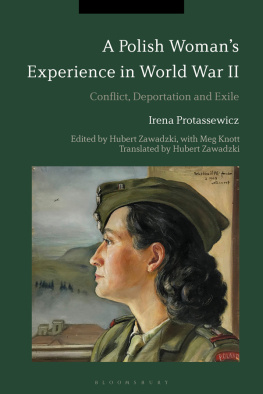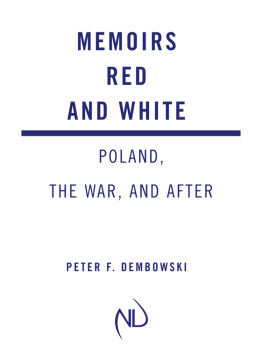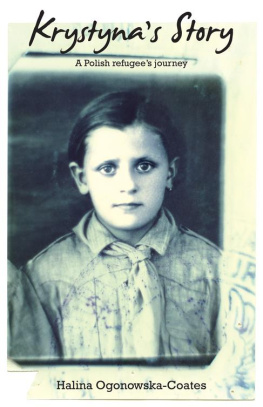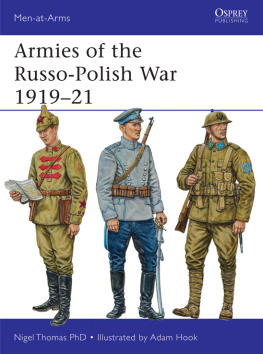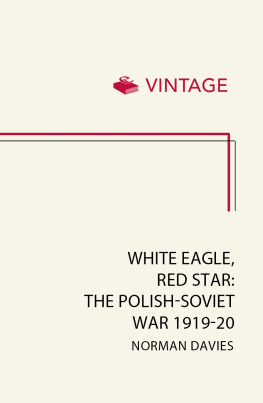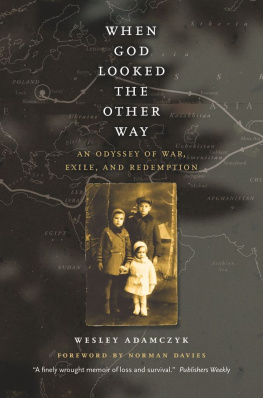Irena Protassewicz - A Polish Woman’s Experience in World War II: Conflict, Deportation and Exile
Here you can read online Irena Protassewicz - A Polish Woman’s Experience in World War II: Conflict, Deportation and Exile full text of the book (entire story) in english for free. Download pdf and epub, get meaning, cover and reviews about this ebook. publisher: Bloomsbury UK, genre: Non-fiction. Description of the work, (preface) as well as reviews are available. Best literature library LitArk.com created for fans of good reading and offers a wide selection of genres:
Romance novel
Science fiction
Adventure
Detective
Science
History
Home and family
Prose
Art
Politics
Computer
Non-fiction
Religion
Business
Children
Humor
Choose a favorite category and find really read worthwhile books. Enjoy immersion in the world of imagination, feel the emotions of the characters or learn something new for yourself, make an fascinating discovery.
- Book:A Polish Woman’s Experience in World War II: Conflict, Deportation and Exile
- Author:
- Publisher:Bloomsbury UK
- Genre:
- Rating:5 / 5
- Favourites:Add to favourites
- Your mark:
A Polish Woman’s Experience in World War II: Conflict, Deportation and Exile: summary, description and annotation
We offer to read an annotation, description, summary or preface (depends on what the author of the book "A Polish Woman’s Experience in World War II: Conflict, Deportation and Exile" wrote himself). If you haven't found the necessary information about the book — write in the comments, we will try to find it.
Publisher: Bloomsbury Academic (February 7, 2019)
Language: English
ISBN-10: 1350079928
ISBN-13: 978-1350079922
This hitherto unpublished first-hand witness account, written in 1968-9, tells the story of a privileged Polish woman whose life was torn apart by the outbreak of the Second World War and Soviet occupation. The account has been translated into English from the original Polish and interwoven with letters and depositions, and is supplemented with commentary and notes for invaluable historical context.
Irena Protassewiczs vivid account begins with the Russian Revolution, followed by a rare insight into the life and mores of the landed gentry of northeastern Poland between the wars, a rural idyll which was to be shattered forever by the coming of the Second World War. Deported in a cattle truck to Siberia and sentenced to a future of forced labour, Irenas fortunes were to change dramatically after Hitlers attack on Russia. She charts the adventure and horror of life as a military nurse with the Polish Army, on a journey that would take her from the wastes of Soviet Central Asia, through the Middle East, to an unlikely ending in the highlands of Scotland. The story concludes with Irenas search to discover the wartime and post-war fate of her family and friends on both sides of the Iron Curtain, and the challenges of life as a refugee in Britain.
A Polish Womans Experience in World War II provides a compelling, personal route into understanding how the greatest conflict of the 20th century transformed the lives of the individuals who lived through it.
**
Review:
Irenas frank and evocatively written memoir is brutally honest and utterly compelling. It offers a rare window on another world that has passed from the scene. My respect for this uncompromising lady grew exponentially as I read her story. She deserved a superb editor and she has received the best she could have imagined. Malcolm Murfett, Visiting Professor of War Studies, Kings College London, UK
What better way to bring the troubled history of wartime Poland alive than through this meticulous family chronicle composed by those who lived it. Paul R. Gregory, Distinguished Professor of Economics, University of Houston, USA
About the Author:
Irena Protassewicz wrote the autobiographical witness account of her dramatic wartime journey from landed privilege in Poland to the hardships of life as a refugee.
Hubert Zawadzki is an independent scholar. He is the co-author, along with Jerzy Lukowski, of A Concise History of Poland (2nd Ed., 2006), which has been translated into seven different languages. He is also the author of A Man of Honour: Adam Czartoryski as a Statesman of Russia and Poland, 1795-1831 (1993).
Meg Knott is an English teacher and freelance editor.
Irena Protassewicz: author's other books
Who wrote A Polish Woman’s Experience in World War II: Conflict, Deportation and Exile? Find out the surname, the name of the author of the book and a list of all author's works by series.

